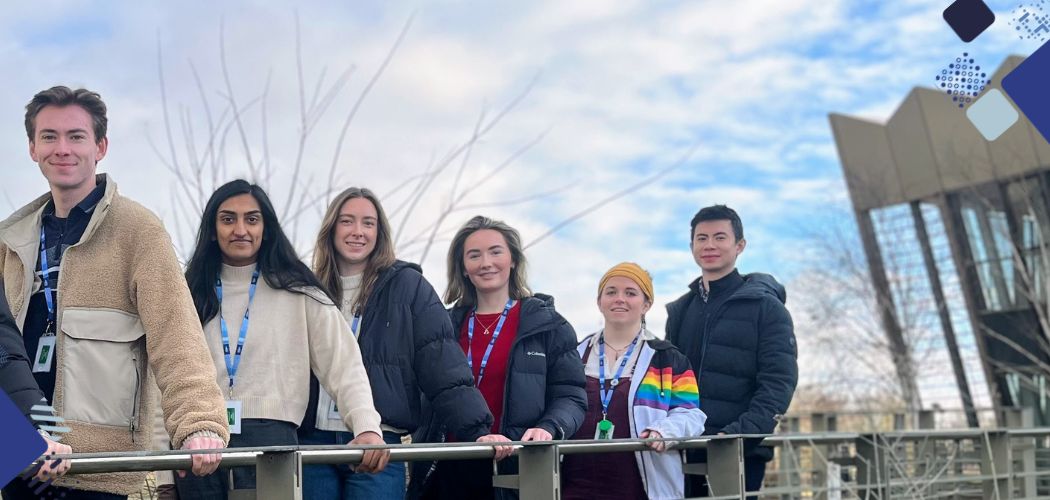Graduate Scheme at The Sanger Institute

Thank you for your interest in our Graduate Scheme. Recruitment for the next cohort has been rescheduled and will now open in autumn 2026. We look forward to sharing further updates closer to the time. While applications are not yet open, we invite you to explore what makes the scheme a unique opportunity.
Embark on a transformative career path at the forefront of genomics research with Sanger Institute. With four diverse placements over two years across our Management and Scientific Operations/Programmes, you’ll experience hands-on learning, and gain a 360-degree view of the institute from day one.
Why Choose Sanger Institute?
- Proven Success: Experience responsibility from day 1, hands-on experience, and develop a broad 360-degree view of the Sanger Institute.
- Unique Work Environment: Experience life at Sanger Institute on our 130-acre campus outside Cambridge. Join a diverse community of 1300+ employees from 80+ nationalities.
Why Our Graduate Scheme?
Joining our Graduate Scheme means being a key player in supporting our ambitions for world-leading genomics research. We offer:
- Our current 2024 cohort comprises of 8 graduates, and 8 host teams. The two-year programme consists of four six-month placements, providing a comprehensive and immersive experience.
- Pivotal Role: Associates are crucial in supporting the institute’s vast ambitions for world-leading genomics research.
- We are keen to grow our own talent. All successful candidates join the scheme on a permanent contract, and we offer soft-skilled training in year 2 to help them secure their next role at Sanger once the scheme ends.
- You don’t need to be a scientist to contribute to science. Associates help support improving human health and understanding of life on Earth.
About Our Graduate Scheme
Our Graduate Scheme is designed to provide associates with hands-on experience, exceptional networking opportunities, and a dynamic learning environment.
We offer four different placements over two years across our Management and Scientific Operations/Programmes at the Sanger Institute. Associates play a crucial role in supporting and managing projects within four departments, offering a diverse range of experiences. These are some of the areas known to host associates:
- Scientific Operations
- Procurement
- The Parasites and Microbes Programme
- The Sanger Logistics Services (SLS) and Supply Chain
- Strategy, Partnerships and Innovation
- Human Genetics and Generative and Synthetic Genomics programmes
- The Cellular Genetics Programme
- The Tree of Life Programme
- Cancer, Ageing and Somatic Mutation Programme
What Happens After the Scheme?
Our commitment doesn’t end with the scheme. We are keen to grow our own talent at Sanger Institute. At the end of the two-year training period, the offer of a permanent role will take place through an internal recruitment process for appropriately suited roles based on skills and organisational gaps.
Extra Perks whilst at Sanger Institute:
- Interest-Free Loan: successful candidates can receive an interest-free £2k loan upon scheme acceptance, aiding with relocation costs, a car or a house rental deposit.
- Second-Year Salary Increase: A £1,500 salary increase during the second year if you have performed satisfactorily and if you can demonstrate the behaviours the organisation values.
- Buddy System and a Mentor: Settle in quickly with a designated buddy, guiding you through Sanger and your new role, ensuring a smooth transition. Your mentor will provide advice, guidance and support to help you navigate your time at the Institute.
- Bespoke Training and Induction: Across the 2-year scheme, graduates take part in a tailored training programme and a comprehensive induction designed to immerse them into the Sanger community. Graduates benefit from exclusive learning opportunities, which are delivered in various formats, including some as a single cohort and others in collaboration with our Tech Talent Scheme. For example, the 2024 cohort has received access to a range of bespoke sessions, covering skills such as process improvement, project management, software training, presentation confidence and impact, and wellbeing development. Please note that the availability and scope of courses may vary from intake to intake, depending on budget, trainer availability, and programme requirements.
